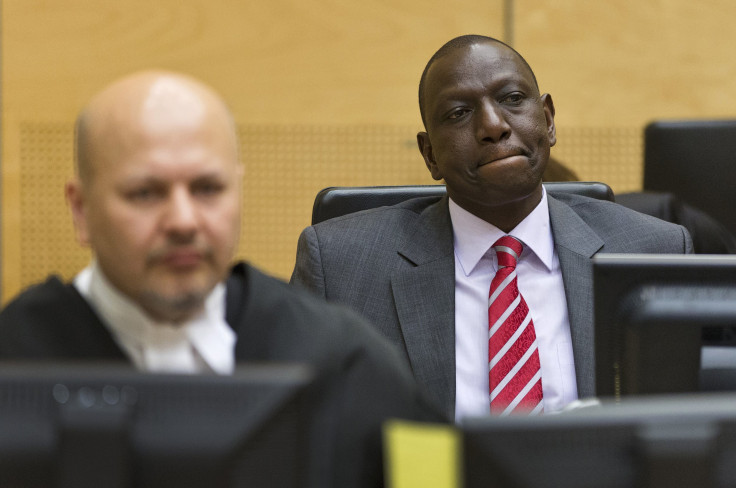Kenya's Day In Court: Vice President Ruto Begins Trial At ICC, Pleads Not Guilty To Crimes Against Humanity

One of the most pivotal criminal trials in recent memory kicked off Tuesday when Kenyan Vice President William Ruto arrived at the International Criminal Court to face charges of human rights abuses.
Ruto's indictment came in 2010, long before he was elected this March to serve as deputy under President Uhuru Kenyatta, who is also indicted at the ICC and is scheduled for trial in November.
Ruto and Kenyatta are suspected of backing militant groups that committed human rights abuses during the violent aftermath of the 2007 presidential election. Ethnic and political clashes killed at least 1,200 people and displaced hundreds of thousands, many of whom are still displaced six years later.
Also beginning trial at the ICC on Tuesday was Joshua Arap Sang, formerly the head of operations at a Nairobi radio station, who is accused of using his programs to help organize and encourage violent attacks. Both Ruto and Sang pleaded innocence as the trial began.
Ruto is known as a steely, ambitious politician. He came from a poor background but moved ahead quickly and was mentored by Kenya's second president, Daniel Arap Moi. Kenyatta was the son of Kenya's first President Jomo Kenyatta. The two men were at odds during the violence of 2007 and 2008, but joined forces to contest the 2013 election. It was a winning tactic for the shrewd campaigners, who took advantage of their looming ICC cases by painting the tribunal as a vehicle of Western interference and positioning themselves as defenders of Kenyan sovereignty.
In a symbolic move not expected to have any effect on the trials of both leaders, Kenya's parliament voted to withdraw from the ICC on Sept. 5.
The Kenyatta/Ruto cases have worsened the tense relationship between African institutions and the international tribunal. Leaders all over the continent have accused the ICC of prosecuting African suspects over all others; indeed, all of the eight investigations currently on the ICC's docket are focused on African crimes and alleged perpetrators. At the African Union summit in May, Ethiopian Prime Minister Hailemariam Desalegn said that "African leaders have to come to a consensus that the process the ICC is conducting in Africa has a flaw. The intention was to avoid any kind of impunity, but now the process has degenerated into some kind of race-hunting.”
The ICC denies these charges, insisting that each case is decided on its own merits. And there's no doubt that the charges leveled against Ruto and Kenyatta are quite serious; according to the court, "Mr. Ruto is accused of being criminally responsible as an indirect co-perpetrator ... for the crimes against humanity of: murder; deportation or forcible transfer of population; and persecution."
Ruto and Kenyatta have pledged to cooperate with the ICC. But if one or both is convicted of crimes against humanity, it could throw Kenyan politics into turmoil. The country is already riven by ethnic differences, which contributed to the bloodshed five years ago and could erupt into violence yet again if an elected president or vice president are sentenced to prison. Assuming the November trial proceeds as planned -- it has already been delayed by myriad difficulties including the withdrawal of key witnesses, possibly due to intimidation -- it will be the first time the ICC has tried a sitting head of state.
© Copyright IBTimes 2024. All rights reserved.





















